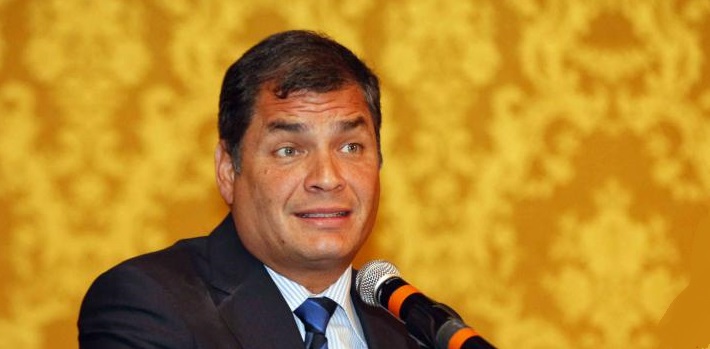
EspañolDuring the recent Tianjin tragedy, the Chinese government feared the press more than it feared the explosions. That’s why officials unleashed a campaign of propaganda and censorship to conceal the facts from the public eye, in the name of “stability.”
Similarly, President Rafael Correa declared a state of emergency in Ecuador following the eruption of the Cotopaxi volcano on August 14.
In other words, he hijacked Ecuadorians’ right to be informed, ensuring that the public only received news on the situation through bulletins released by the Ministry of Security. In doing so, the president formally established an already existing censorship against independent media outlets and social networks in the name of “avoiding rumors and ensuring security.”
However, international media is out of Correa’s reach, and they were able to expose, once again, his dictatorship and the puppets working for him behind the scenes.
On August 18, French daily Le Monde published an article by Sylvie Brunel that described Cotopaxi’s eruption as a “useful catastrophe.” She writes that it allowed the Correa government to declare a state of emergency and suspend constitutional rights, including free speech, in the name of “national security,” at a time when the government faced a series of protests.
Moreover, in another article in Le Monde, published on August 19, Didier Fassin wrote that “arbitrariness must end its reign in Ecuador.”
The French journalist described the violent arrests of indigenous leaders Salvador Quishpe, governor of the Zamora province, and Carlos Pérez Guartambel, president of Ecuarunari, during the nationwide demonstrations. He also wrote of the arbitrary arrest of French-Brazilian journalist Manuela Picq, whose visa the government revoked without any legal basis.
[adrotate group=”8″]
Meanwhile, the Guardian reported on the brutal government repression that occurred in Quito during the protests, while President Correa surrounded himself with supporters and sang cheerfully a few blocks away.
They also gave an account of the violent police crackdown in Saraguro, Loja province, where officers wounded and detained several people who committed no crime whatsoever. Ironically, a government whose slogan is “Ecuador loves life” showed no respect for the elderly, children, or women who were dragged and stripped of their traditional attire.
Likewise, the Economist wondered if Ecuador would become Latin America’s Greece.
As usual, Correa resorted to denial, victimization, and insults to discredit the international press. On his weekly TV show Citizen Link, the president called the journalists liars before sarcastically inviting them to join the indigenous movement, and even accused them of being part of a smear campaign to harm the country.
Correa’s accusations unleashed a Twitter war against those outlets, and encouraged his supporters to join the online crusade.
.@TheEconomist Stop lying about #Ecuador Come to this country and verify the reality before publishing false statements. More decency.
— Rafael Correa (@MashiRafael) September 6, 2015
The international press must certainly know by now that the only information coming from Ecuador these days is what Correa decides to share, since his Secretariat of Communication (SECOM) is in charge of shaping the official narrative and exalting the president’s personality cult.
Correa knows that his credibility, regime, and his goals will only survive to the extent that he can control information, and distort, manipulate, and omit facts when the time comes.
A letter from the Ecuadorian ambassador in London to the Guardian illustrates this point. In these times of “Citizen Revolution,” it’s sad to see how the people’s representative to a foreign nation has been reduced to a mouthpiece for the president’s distortions.
In his statement, Ambassador Carlos Abad insists that the “right to protest in Ecuador is absolutely guaranteed.” He says the public completely supports the government, as evidenced by its 10 consecutive victories in elections, and that it is merely those who have lost certain privileges who are protesting.
Correa has completely detached himself from reality. In his world, the more retweets and Facebook likes his paid supporters send out, the less important facts become that contradict his fairytale reality.
The truth takes a back seat with President Correa, so long as he can disguise from the rest of the world his abuses and complete disregard for the rule while maintaining some hint of political legitimacy.
By seizing the means of communication, gagging journalists, stifling social media, enacting restrictive laws, and resorting to fear and intimidation, Correa aims to isolate us from the rest of the world, and keep the ugly side of his “Ecuadorian miracle” under wraps.
Just like any other dictator, he abhors individual liberty and does not tolerate political or ideological diversity.
It’s worth remembering that the president squandered US$2.99 million of our money to broadcast the “All You Need Is Ecuador” ad during the Super Bowl. And yet, instead of a tourist destination, Ecuador is increasingly becoming recognized internationally as a place where the government represses individual freedom and dignity.
 Versión Español
Versión Español












